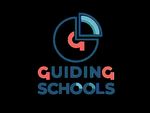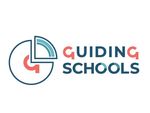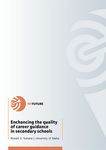THE GUIDING SCHOOLS PROJECT - dvb-Fachverband
←
→
Page content transcription
If your browser does not render page correctly, please read the page content below
VOL. 1 | MARCH 2021
ENHANCING THE QUALITY OF
CAREER GUIDANCE IN SECONDARY SCHOOLS
THE GUIDING SCHOOLS PROJECT WHERE DOES THE
Guiding Schools is a project financed by the Erasmus plus
PROJECT COME FROM?
(KA2) program and involves eight partners from seven
European countries. The project works to define
The Guiding Schools project arises from the
internationally and implement locally a quality framework
great outcomes of a previous European KA2
for career guidance in secondary schools.
project called MYFUTURE. In this project Prof.
It will develop 4 outputs which will consist in digital tools
Ronald G. Sultana from the University of Malta,
to help schools improve their provision of career learning
one of the leading experts on career guidance
and guidance services.
worldwide, was invited to create the
Handbook “Enhancing the quality of career
The first product consists in a quality framework for
guidance in secondary schools” to help
career learning at school, based on the European
secondary schools improve quality of their
approach of Career Management Skills.
career guidance services. The Handbook
The second is an online self-assessment tool to check,
represents at the same time a clear and
identify and address the gaps and improve the weakest
effective compendium of theoretical guidance
areas of the career guidance system of each school. It will
and methodological resources for secondary
support schools to play an active role in the definition and
schools and stakeholders involved in career
the implementation of the main aspects of the quality
guidance services (available on the MYFUTURE
framework.
website). The document was presented in
The third is a new e-learning platform aimed at
several international conferences and it
empowering the community of teachers, practitioners and
obtained a considerable success for the
school staff to implement the quality system and to
interest that ministries and institutions from
support and help students in the complex task of career
all over the world showed towards it (it is now
planning and development.
available in 5 languages). The Guiding Schools
Finally, the fourth is an integrated e-guidance platform,
project aims to move further on this valuable
to provide schools with an effective career guidance
path in order to adapt the Handbook, and to
system powered through accessible digital tools, webinar
pilot it into national contexts. In the next
and video interviews devices, video-tutorials, career
weeks, practitioners and experts from seven
software and career information resources.
European countries (Belgium, Germany, Italy,
Norway, Macedonia, Spain and Sweden) will be
The project sees the participation of the University of Bari
invited to take part in a participatory research
and Centro Studi Pluriversum in Italy, University of
Santiago de Compostela in Spain, GÖTEBORGS STAD, the to discuss how to improve
Career Guidance Centre of the city of Göteborg in quality of career guidance in
Sweden, Inland Norway University of Applied Sciences in secondary schools in their
national contexts. We invite
Norway, The Centre for Education and Development in
you to subscribe to the
Macedonia, The Square Dot team in Belgium and
newsletter to be informed
Deutscher Verband für Bildungs-und Berufsberatung e.V.
on the upcoming focus
in Germany.
groups.DEVELOPING QUALITY IN
CAREER GUIDANCE
ERIK HAGASETH HAUG (PHD)
To develop systems for quality in career
guidance is high on the agenda in European
countries. In this short introduction, we will
focus on main issues to pay attention to in
such a development.
As a starting point, defining quality in career
guidance would be useful.
DEFINING QUALITY IN CAREER GUIDANCE The model emphasizes an awareness of the
need to ground career guidance approaches in
The Oxford dictionary defines quality as the specificities of economic, social and
“the standard of something as measured cultural realities to secure that the action
against other things of a similar kind; the taken resonates with the specific issues in a
degree of excellence of something”. Hooley given context. This implies that before a
and Rice (2018) describe quality assurance in quality framework can be fully utilized, it has
career development as “a range of techniques to be adjusted and customized according to
that can be used to ensure consistency in the the given contexts. It involves taking a quality
way that activities are approached.” As seen in system in a context perspective that considers
the definitions, it is important to focus on (1) complexity and avoids oversimplification of
“what should be measured and how do we societal structures and mechanisms that
know that it is excellent?”, (2) “what should be potentially affect the usefulness of it. Building
done to meet the excellent outcome?”. This on Hooley (2019), this short introduction can be
includes both how the service is organized and summarized as follows. A quality system
the concrete activities chosen to meet the cannot just be a framework that is written
expected outcomes. That said, it is important down (Hooley, 2019). If it is going to have an
to be aware that expected outcomes, “what impact, both on an individual and societal
level:
should be excellent”, may differ among
- it needs to be implemented and governed
different stakeholders. As stated by professor
carefully,
Sultana: “‘If you scratch below the surface, we
- it needs to be built on lessons learnt from
discover that we have different views about
other countries and theoretical contributions
what ‘quality’ really is. This is likely to depend
on the complexity of quality as concept,
on who we are, our social background, the
- it needs to be combined with a sustained
evaluative criteria we use, past experiences,
awareness of the need to be context resonant
and so on. Most importantly, different people
for national, regional and local characteristics.
have different expectations and standards’
(Sultana, 2018, p. 8). Moreover, “How issues of
quality are conceptualised and addressed in
WATCH THE
the field of career guidance varies across
different countries and contexts for policy and WEBINAR ON
practice” (Hooley & Rice, 2018). QUALITY IN
CAREER GUIDANCE!
A NEED FOR CONTEXT-RESONANT SYSTEM
FOR QUALITY ASSURANCE On the project Youtube channel, find the
introductory lecture by Dr. Erik
Following the argumentation, it is Hagaseth Haug on quality in career
recommended to pay close attention to guidance: https://youtu.be/Fr-jFFnnHOg
national, regional and even local contextual
differences to ensure that the systems
developed to assure quality fit the given
context. This implies the need to focus on both
measuring if we meet a given set of standards
or recommendations, and at the same time we
give attention to whether the chosen
outcomes, activities and organization are
relevant.WHERE DOES GERMANY STAND REGARDING ASSURING QUALITY OF CAREER GUIDANCE
SERVICES IN SECONDARY SCHOOLS?
Career orientation at schools is the responsibility of the Ministries of Education and Cultural Affairs of the
federal states, so that there are several specific guidelines on the objectives, scope and quality assurance
activities within Career Orientation at schools. All concepts have the following two points in common: (1)
through career guidance, students should acquire the competence to decide on their own responsibility
For vocational training or study. A central concept is the expectation that these will also be successfully
completed. An important aim is to avoid drop-outs from training and studies which are judged as deficits
of career orientation. The theoretical basis for this is provided by the pedagogical concept of “career
choice competence”. (2) From policy’s point of view, it is of fundamental importance that all young
people enter a further step of education after their first school-leaving certificate, i. e. vocational
education and training or higher education. Unemployment (NEET) is to be avoided at all costs. There are
many initiatives and measures which focus on further qualifying those students that are underachieving
and disadvantaged to enable them for the transition to the labour market (i.e. programmes: "education
chains", "no graduation without connection"). In many cases, career guidance activities are therefore
concentrated on the regional labour market and the regional structure of tertiary education institutions
(“regional transition management”).
Quality assurance is primarily located at school or regional level. The implementation of career guidance
in schools is evaluated. However, the long-term effects of these activities cannot be measured directly.
The vocational orientation programme of the Federal Ministry of Education and Research (BMBF) was
evaluated in accompanying scientific research. Since it was aimed at pupils in the 7th-8th grade in the
first phase, long-term effects cannot be noted here either. Empirical research on educational biographies
and vocational transitions is gradually becoming established in Germany: on the one hand as dedicated
educational research on career orientation and guidance and on the other hand in several long-term
panel studies (NEPS, student survey of the DZHW)5, which allow conclusions to be drawn about the
longer-term effects of career orientation activities and their institutional, familial and social contexts.
HOW CAN YOU BE INVOLVED?
take part in the
subscribe check out the
national focus
to the newsletter project resources
groups
www.guidingschools.eu
info@guidingchools.eu
@guidingschools
https://www.youtube.com/channel
/UC4GNLpM3iF4iuull_ESYjowYou can also read























































